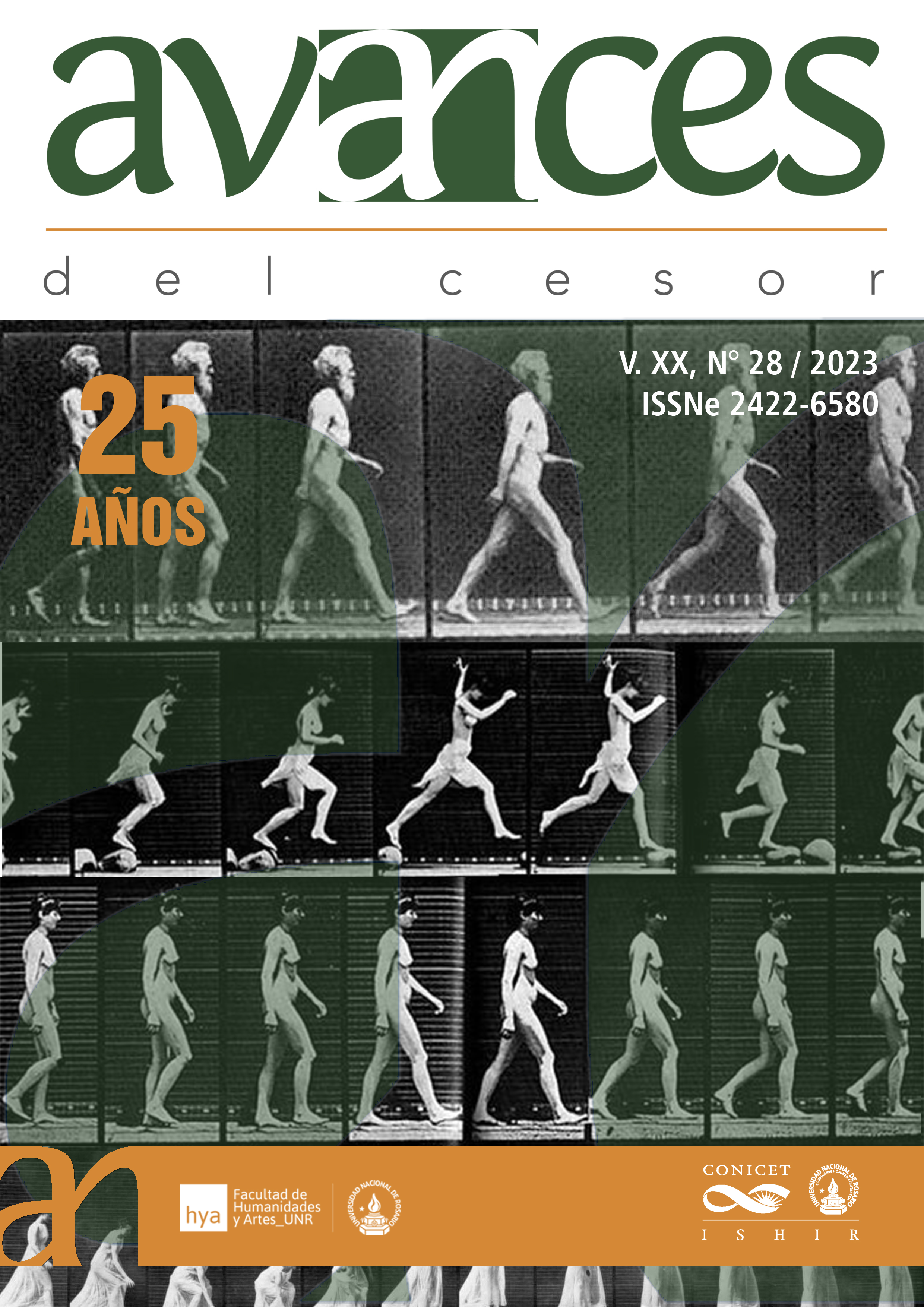The curvature of the lexicon in the poetry of anarchist workers of the nineteenth century in Uruguay
DOI:
https://doi.org/10.35305/ac.v20i28.1805Keywords:
poetry, Anarchism, workers, Uruguay, 1900Abstract
In the unpublished poems of 14 male anarchist workers residing in Uruguay at the beginning of the 20th century, emerges both a contamination of a conceptual civilizing discourse, typical of bourgeois intellectuals, and the saturation of a prelinguistic language immersed in adjectives and images, attractive to audiences with little literate culture. In this sway, the resistance to social domestication on the part of institutional politics is forged, which, in a first moment, achieves the curvature of the lexicon (Lourau). The rebound movement and insurrectionary hope rise up by appealing to the cry and the praxis of the poet-activist. This prelinguistic dimension and the vital buttress of the questioning subject, link the symbolic universe with the real world enabling the subversive instance. The poems signed by workers emerge from the corpus of anarchist poetry on a time of hybrid aesthetics and legitimizing tensions (Vidal), mostly signed by writers with anarchist thinking rather than by anarchist that write (Ansolabehere; Lida; Delgado), amazed more by the world of the letters rather than the anonymous revolutionary combat.
Downloads
References
Abad de Santillán, D. (2005). La Protesta. Su historia, sus diversas fases y su significación en el movimiento anarquista de América del Sur. En M. Nettlau, D. Abad de Santillán, J. C. Valadés, E. López Arango, L. Fabbri, U. Trene, B. Aladino, Certamen Internacional de “La Protesta” en ocasión del 30o aniversario de la fundación del periódico “La Protesta Humana” (pp. 34-71). Buenos Aires: La Protesta / CeDInCI.
Achugar, H. (1985). Modernización, europeización, cuestionamiento: El lirismo social en Uruguay entre 1895 y 1911. En Autor, Poesía y sociedad (pp. 137-169). Montevideo: Arca.
Agamben, G. (2002). Lo abierto. El hombre y el animal (1942). Buenos Aires: Adriana Hidalgo.
Ansolabehere, P. (2011). Literatura y anarquismo en Argentina (1879-1919). Buenos Aires: Beatriz Viterbo.
Auerbach, E. (1950). Mimesis: la realidad en la literatura (1942). Ciudad de México: Fondo de Cultura Económica.
Bakunin, M. (2004). Estatismo y anarquía. Buenos Aires: Anarres.
Calvo Carrilla, J. L. (2020). Sobre el aullido de Ginsberg y el grito de Miguel Labordeta. Tropelías, (7), 60-74.
Cappelletti, Á. J. y Rama, C. (1990). Anarquismo latinoamericano. En C. Rama y Á. J. Cappelletti (selección y notas), Ángel J. Cappelleti (prólogo y cronología), El anarquismo en América Latina (pp. IX-CCXVI). Caracas: Biblioteca Ayacucho.
Delgado, L. (2017) Anarquismo en el Novecientos rioplatense. Cultura, literatura y escritura.
Montevideo: Estuario.
Fabbri, L. (1998). Caracteres e importancia del autodidactismo obrero. Brecha, (682),. 4-5.
Falco, Á. (1906). ¡Ave Francia!. Montevideo: Talleres “El Arte”.
Falco, Á. (1907). Cantos rojos. Buenos Aires/Ciudad de México: Maucci Hnos e Hijos.
Golluscio de Montoya, E. (1995). El patrimonio dramático libertario (Río de la Plata 1890-1914). En O. Pellettieri (Coord.), El teatro y los días. Estudios sobre teatro argentino e iberoamericano (pp. 111-119). Buenos Aires: Editorial Galerna / Facultad de Filosofía y Letras, UBA.
Litvak, L. (1981). Musa libertaria, arte, literatura y vida cultural del anarquismo español (1880-1913). Barcelona: Antoni Bosch.
Lourau, R. (2001). La institución en negación simple o doble. El rol de los intelectuales que analizan el poder. En Autor, Los intelectuales y el poder (pp. 111-122). Montevideo: Nordan comunidad.
Lourau, R. (2008). El estado-inconsciente. La Plata: Terramar ediciones.
Mannheim, K. (2010). Ideología y utopía. Introducción a la sociología del conocimiento (1929). México: Fondo de Cultura Económica.
Marinetti, F. T. (1978). Manifiestos y textos futuristas. 1968. Barcelona: Ediciones del Canal.
Mortara Garavelli, B. (1991) Manual de retórica. Madrid: Cátedra.
Muñoz, P. (2017) Antonio Loredo. Aletazos de tormenta. El anarquismo revolucionario a comienzos del siglo XIX. Montevideo: Turba ediciones.
Quiroga, N. (2002). Prácticas políticas y cambio cultural: anarquistas autodidactas hacia mediados de 1940. Estudos Ibero-Americanos, 30(1), 139-160. https://doi.org/10.15448/1980-864X.2004.1.23524
Rama, C. (1956). Batlle y el movimiento obrero y social. En A. Ardao; C. M. Rama; C. Maggi; I. Ganon; A. Reta; E. M. Narancio; A. M. Grompone; J. A. Oddone; F. De Ferrari; L. Hierro Gambardella; E. Rodriguez Fabregat: L. Bonavita Fabregat, Batlle, su obra y su vida (pp. 37-59). Montevideo: Acción.
Rancière, J. (2017). La noche de los proletarios. Archivos del sueño obrero (1981). Buenos Aires: Tinta limón ediciones.
Real de Azúa, C. (1977). El modernismo literario y las ideologías. Escritura (3), 41-75.
Rivera Cusicanqui, S y Lehm Ardaya, Z. (2013). Lxs artesanxs libertarixs y la ética del trabajo (1988). Buenos Aires: Tinta Limón y Madreselva ediciones.
Rodríguez Díaz, U. (1994): Los sectores populares en el Uruguay del Novecientos. Montevideo: Tae.
Sabat Ercasty, C. (1993). La lírica de Vasseur. En Á. A. Vasseur, Poesías (pp. 49-53). Montevideo: Talleres Gráficos Gaceta Comercial.
Tarcus, H. (2007). Diccionario biográfico de la izquierda argentina. De los anarquistas a la “nueva izquierda” (1870-1976). Buenos Aires: Emecé editores S. A.
Thompson, E. P. (2012) La formación de la clase obrera en Inglaterra (1963). Madrid: Capitán Swing Libros.
Vanger, M. I. (1983). El país modelo. José Batlle y Ordóñez 1907-1915. 1980. Montevideo: Arca Ediciones de la Banda Oriental.
Vidal, D. (2012). Ensayo y aborto de la primera revolución obrera en el Uruguay. En G. Fernández y D. Vidal, Orígenes del movimiento obrero y la 1a. Huelga General en Uruguay (pp. 63-140). Montevideo: Editorial Aportes.
Vidal, D. (2017). Wet gunpowder: anarchism and futurism meet in Montevideo. En G. Berghaus (ed.), International Yearbook of Futurism Studies. Futurism in Latin America (pp. 115-135). Berlín: Walter de Gruyter.
Vidal, D. (2019). La disputa por el pueblo entre el anarquismo y el primer batllismo (Uruguay, 1903-1913). En R. González Leandri y A. Minguzzi (Comps.), Narrativas de la cohesión social en publicaciones periódicas del Cono Sur americano, 1900-1940 (pp. 183-207). Madrid: Ediciones Polifeno.
Vidal, D. (2021). Flores negras. Poesía y anarquismos en el Uruguay del Novecientos. Montevideo: Astromulo.
Vidal, D. y Minguzzi, A. (2021). Palabras soñadas y vividas. En Autores (Comps.), Contra toda autoridad. Literatura anarquista rioplatense (1886-1918) (pp. 11-28). Buenos Aires: Trenenmovimiento.
Zubillaga, C. (2008). Perfiles en sombra. Aportes a un diccionario biográfico de los orígenes del movimiento sindical en Uruguay (1870-1910). Montevideo: Librería de la Facultad de Humanidades y Ciencias de la Educación.
Published
How to Cite
Issue
Section
License

This work is licensed under a Creative Commons Attribution 4.0 International License.
Avances del CESOR ratifies the Open Access model in which the contents of scientific publications are fully available for free on the Internet, without temporary embargoes, and whose publishing costs are not transferred to the authors. This policy aims to break the economic barriers that generate inequities in access to information, and publication of research results.
Authors retain the copyrights of their papers and grant the journal right of first publication with the work simultaneously licensed under a Creative Commons that allows others to share the work with an acknowledgement of the work's authorship and initial publication in this journal.



















































